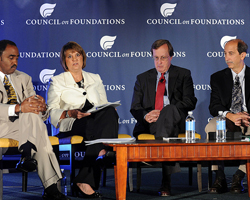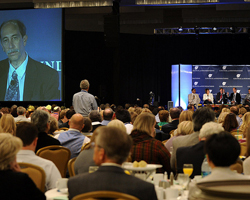Keep Your Friends Close and Your Competitors Closer Plenary Highlights
 Conference attendees looking for a seat at Tuesday morning’s plenary session, “Keep Your Friends Close and Your Competitors Closer,” had a hard time finding one. Competition isn’t a subject that community foundation professionals always feel comfortable talking about, but everyone was eager to hear what the panel of presenters—Brenda Chumley, Andrew Bangser, Emmett Carson, and Ben Pierce—had to say about this important topic.
Conference attendees looking for a seat at Tuesday morning’s plenary session, “Keep Your Friends Close and Your Competitors Closer,” had a hard time finding one. Competition isn’t a subject that community foundation professionals always feel comfortable talking about, but everyone was eager to hear what the panel of presenters—Brenda Chumley, Andrew Bangser, Emmett Carson, and Ben Pierce—had to say about this important topic. “We have to challenge our assumptions,” said moderator John Kobara, executive vice president and COO of the California Community Foundation. He noted that the swastika—which is more than 3,000 years old and actually means good fortune—has come to symbolize hatred and bigotry. In the same way we have to see past perceptions that have been forced on us, Kobara said, we have to formulate new solutions to issues facing the field. “What do our customers want? They want efficiency, and they want to know that their money is making a difference in the world. But are we confident or complacent in our philanthropy?” he asked before turning the floor over to panelists.
"If we don’t correct our financial model, I fear that many of the institutions represented in this room won’t be here in five to 10 years."
~Emmett Carson
 Comments from Pierce, president of the Vanguard Charitable Endowment Program, and Bangser, president of Foundation Source, ignited the conversation. Chumley, senior vice president of administration for the Greater Kansas City Community Foundation, spoke at length about best practices and ways her organization uses internal checks and balances—including a rigorous self-imposed audit system—to guarantee that donor dollars are being put to the best use. Still, the financial model for community foundations is unquestionably broken, suggested Carson, CEO and president of the Silicon Valley Community Foundation.
Comments from Pierce, president of the Vanguard Charitable Endowment Program, and Bangser, president of Foundation Source, ignited the conversation. Chumley, senior vice president of administration for the Greater Kansas City Community Foundation, spoke at length about best practices and ways her organization uses internal checks and balances—including a rigorous self-imposed audit system—to guarantee that donor dollars are being put to the best use. Still, the financial model for community foundations is unquestionably broken, suggested Carson, CEO and president of the Silicon Valley Community Foundation. “With the 100th anniversary [of the first community foundation] coming up, we need to establish this financial task force and understand what business we are in. Are we in the investment-management business? Are we in the asset-accumulation business? Are we in the convener business? Are we in the leadership business? We may well have different models of community foundations going forward,” Carson explained.
“If we don’t correct our financial model, I fear that many of the institutions represented in this room won’t be here in five to 10 years. There are other people who are offering what we have perceived as our core product at a cheaper price. We’ve got studies coming out that say we ought to be raising prices. And in this environment—talk to Netflix—that doesn’t work.”


